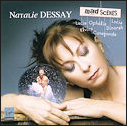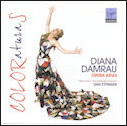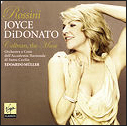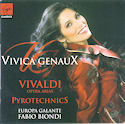EXTENDED PLAY – COLOURFUL COLORATURAS
By Seth Estrin
These new releases showcase four of the finest coloratura opera singers on stage today. Together, they offer the listener numerous opportunities to marvel at both the technical and emotive capabilities of the human voice when placed in the throat of superb dramatic actors.
 French soprano Natalie Dessay’s disc Mad Scenes (Virgin Classics 6 99469 0) brings together mad scenes from I Puritani, Hamlet, Candide, and Le Pardon de Ploërmel bookended by two recordings of the famous demise of Lucia di Lammermoor – one in French, and one in Italian. All the material on this CD has been previously released, yet it makes a compelling if (perhaps appropriately considering the theme), idiosyncratic compilation. Composers from Donizetti to Bernstein were united by an unwritten rule: the crazier the heroine, the faster and higher her music. Fortunately, Dessay can sing both very fast and very high (up to a sustained G above high C in the Meyerbeer selection). What’s more, she can do so while convincingly sounding insane, alternating between moments of delicate serenity and full-blooded drama when her plangent voice almost threatens to unravel. If you are not already familiar with Dessay’s artistry, this is an excellent starting-point.
French soprano Natalie Dessay’s disc Mad Scenes (Virgin Classics 6 99469 0) brings together mad scenes from I Puritani, Hamlet, Candide, and Le Pardon de Ploërmel bookended by two recordings of the famous demise of Lucia di Lammermoor – one in French, and one in Italian. All the material on this CD has been previously released, yet it makes a compelling if (perhaps appropriately considering the theme), idiosyncratic compilation. Composers from Donizetti to Bernstein were united by an unwritten rule: the crazier the heroine, the faster and higher her music. Fortunately, Dessay can sing both very fast and very high (up to a sustained G above high C in the Meyerbeer selection). What’s more, she can do so while convincingly sounding insane, alternating between moments of delicate serenity and full-blooded drama when her plangent voice almost threatens to unravel. If you are not already familiar with Dessay’s artistry, this is an excellent starting-point.
 German soprano Diana Damrau’s voice is essentially of the same type as Dessay, less delicate and poised but somewhat brighter and more full-bodied, and so it is not a surprise to find some of the same selections on her disc Coloratura Opera Arias with the Münchner RFO under Dan Ettinger (Virgin Classics 5 19313 2). It is a testament to the abilities of both singers that they can bring strikingly different yet equally convincing approaches to similar repertoire – both of their over-the-top interpretations of Bernstein’s “Glitter and be gay” are not to be missed. Damrau’s fluttering voice has a natural smile that she uses to great advantage in portraying ebullient characters such as Zerbinetta, Rosina, and Oscar. Yet even in more subdued moods, such as when portraying Anne Trulove, her dramatic inclinations are spot-on. Aided by perfect enunciation, Damrau is so immersed in her characters that you hardly notice her modulating between four different languages in this varied program. This is an outstanding disc from beginning to end.
German soprano Diana Damrau’s voice is essentially of the same type as Dessay, less delicate and poised but somewhat brighter and more full-bodied, and so it is not a surprise to find some of the same selections on her disc Coloratura Opera Arias with the Münchner RFO under Dan Ettinger (Virgin Classics 5 19313 2). It is a testament to the abilities of both singers that they can bring strikingly different yet equally convincing approaches to similar repertoire – both of their over-the-top interpretations of Bernstein’s “Glitter and be gay” are not to be missed. Damrau’s fluttering voice has a natural smile that she uses to great advantage in portraying ebullient characters such as Zerbinetta, Rosina, and Oscar. Yet even in more subdued moods, such as when portraying Anne Trulove, her dramatic inclinations are spot-on. Aided by perfect enunciation, Damrau is so immersed in her characters that you hardly notice her modulating between four different languages in this varied program. This is an outstanding disc from beginning to end.
 Mezzo Joyce DiDonato tackles more limited repertoire, focusing on arias written by Rossini for the famous singer Isabella Colbran on Colbran, the Muse with the Orchestra e Coro dell'Accademia Nazionale di Santa Cecilia under Edoardo Muller (Virgin Classics 6 94579 0). Written as showpieces for a particular singer’s unique voice, Colbran’s roles are notoriously difficult to sing, but I doubt they have been better sung in modern times than on this disc. DiDonato has an intense, focused voice with a quick vibrato, impeccable coloratura, and lovely legato. But she is not afraid to embolden it with robust expressions of joy or desperation. Her incredible range allows DiDonato to bring to roles that are often sung by lighter sopranos (such as Elena, Semiramide, and Armida) a richer mezzo tonal colour, but without any hint of strain or lack of high notes. An exceptional release, with excellent support from both orchestral and vocal colleagues.
Mezzo Joyce DiDonato tackles more limited repertoire, focusing on arias written by Rossini for the famous singer Isabella Colbran on Colbran, the Muse with the Orchestra e Coro dell'Accademia Nazionale di Santa Cecilia under Edoardo Muller (Virgin Classics 6 94579 0). Written as showpieces for a particular singer’s unique voice, Colbran’s roles are notoriously difficult to sing, but I doubt they have been better sung in modern times than on this disc. DiDonato has an intense, focused voice with a quick vibrato, impeccable coloratura, and lovely legato. But she is not afraid to embolden it with robust expressions of joy or desperation. Her incredible range allows DiDonato to bring to roles that are often sung by lighter sopranos (such as Elena, Semiramide, and Armida) a richer mezzo tonal colour, but without any hint of strain or lack of high notes. An exceptional release, with excellent support from both orchestral and vocal colleagues.
 Fellow American mezzo Vivica Genaux, likewise concentrates on a single composer: Vivaldi, on Pyrotechnics - Vivaldi Opera Arias (Virgin Classics 6 94573 0). Genaux’s disc rivals DiDonato’s not simply for the number of notes sung or the sheer technical accomplishment of the singing, but also for the skill with which she uses coloratura to express emotion. Though her voice is earthy and vibrant, with a visceral, palpitating quality, it is light enough to give it a buoyancy that allows Genaux to navigate astoundingly difficult coloratura with ease. This facility with the passagework lets her focus on the drama, so that arias such as “Agitata da due venti” from La Griselda are not simply Baroque showpieces, but music sung by true operatic characters. Genaux’s singing is bolstered by the flamboyant playing of the period instrument group Europa Galante under Fabio Biondi.
Fellow American mezzo Vivica Genaux, likewise concentrates on a single composer: Vivaldi, on Pyrotechnics - Vivaldi Opera Arias (Virgin Classics 6 94573 0). Genaux’s disc rivals DiDonato’s not simply for the number of notes sung or the sheer technical accomplishment of the singing, but also for the skill with which she uses coloratura to express emotion. Though her voice is earthy and vibrant, with a visceral, palpitating quality, it is light enough to give it a buoyancy that allows Genaux to navigate astoundingly difficult coloratura with ease. This facility with the passagework lets her focus on the drama, so that arias such as “Agitata da due venti” from La Griselda are not simply Baroque showpieces, but music sung by true operatic characters. Genaux’s singing is bolstered by the flamboyant playing of the period instrument group Europa Galante under Fabio Biondi.
Seth Estrin



